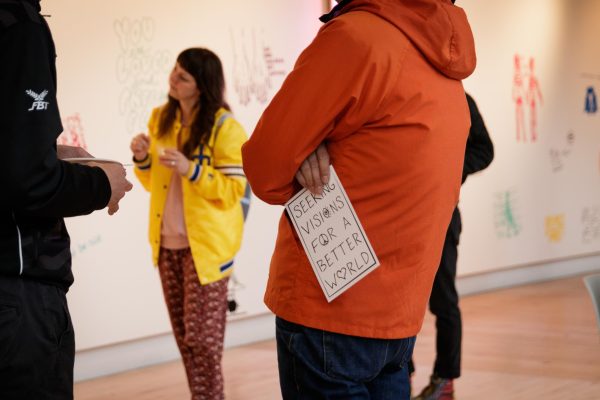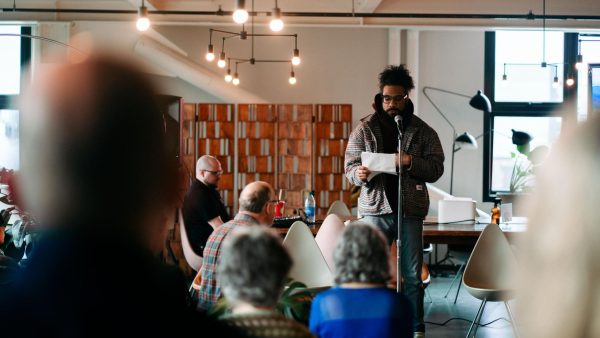Web Series highlights Seattle U Muslim Community
While it typically hosts scientific presentations, Seattle University’s Wyckoff Auditorium was instead the site of a film screening and panel discussion the evening of May 30. Hosted by the Film Studies department in conjunction with nonprofits World Without Hate and PopSugar, the screening of documentary style web series “Secret Life of Muslims” features short first-person stories of some of the United States’ approximately 3.3 million Muslims.
Director Joshua Seftel thought of creating the series after coming across a statistic which said that over half of Americans hold unfavorable views of Muslims.
“I connected with that statistic because growing up I felt as a Jew in a small town in upstate New York I faced a lot of anti-Semitism,” Seftel said. “And so, I decided to try to create a series of short films that could be shared very easily on social media with the hope that it could tell a different narrative than was tending to be told.”
It took Seftel about six years to find the funding for the pilot season and he said the 2016 U.S. presidential election that was a large factor in prompting financial support for his project. He said that the tone of the comments coming from some candidates was so striking and full of misinformation that it created a sense of urgency in countering that.
Founder of Seattle social justice start-up popUPjustice Aurora Martin collaborated with the nonprofit organization World Without Hate to bring the screening to Seattle U. She said that digital media has a unique ability to connect and educate people, though she warned that it can also overwhelm people.
“I think something like the series of ‘Secret Life of Muslims’ is so critical on an audio and visual level to contribute to this digital quilt, that is also impacting the way in which students will learn and experience,” Martin said.
One of the panelists, Troy Prince, specializes in peace studies and found the series to be successful because it creates personal relationships between the films’ subjects and the viewer.
“I just thought they were so effective at making me, even though they’re very short, making me feel like I knew someone,” Prince said. “You very quickly feel like you’re being engaged in a very honest way.”
Seftel said that the power of his series comes in the stories told. Each three to four minute film focuses on a particular Muslim American and simply allows the subject to speak for themselves on their experiences and identities.
“There’s nothing overtly political in these films in my opinion, they’re human stories,” Seftel said. “You can’t really argue with them because they’re someone telling their experience.”
The first season of the Emmy nominated series premiered Nov. 2, 2016, just six days before the presidential election. Before his tragic death, Prince said he couldn’t help but wonder what kind of impact the series could have had on the presidential campaign and election if released earlier. He had a suspicion that a lot of Americans, who have little knowledge of the Muslim community, grabbed onto various soundbites of policy and sentiment from the election and then held them to be true. Prince thought that if people had more exposure to realize that Islam is nothing scary, then they may have paused a bit and questioned those soundbites a bit more.
When identifying a primary cause for the negative sentiment that mass media has for Muslims in America, Seftel and Prince both pointed towards the attacks on Sept. 1, 2001 and the media coverage following the event. Seftel said that almost all of the people he spoke with for the project had their own “9/11 moment”, in which they noticed a marked difference in how they were treated after the attacks.
Prince, Martin and Seftel all said that media coverage following the attacks only heightened the divide and placed an undue burden on Muslim Americans for events which they had nothing to do with. Seftel said that xenophobic stories are easier to sell and creating a sense of otherness is a way for people to feel safer and disconnect themselves from the threat.
Martin said that is the reason why media such as “Secret Life of Muslims” is so important, because it democratizes the media and gives people the chance to counter the stereotyped versions of themselves.
Seftel said that the most encouraging part of the project has been the engagement from viewers who say that the videos have given them a new tool through which to consider Muslims.
“I expected for it to not be easy and it was worth the persistence,” Seftel said. “We never gave up and in the end I hope it has contributed in some small way to a more constructive dialogue.”
Sofía may be reached at
[email protected]







![Jordan Ward [REVIEW]](https://seattlespectator.com/wp-content/uploads/2024/04/ward_1-600x400.jpg)

![COWBOY CARTER [REVIEW]](https://seattlespectator.com/wp-content/uploads/2024/04/Screenshot-2024-04-10-at-7.37.52 PM-600x349.png)